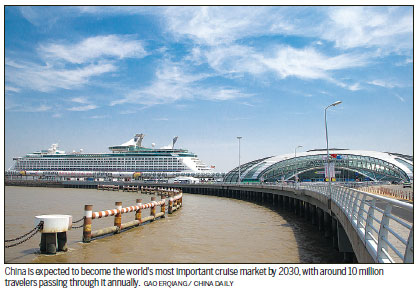Shanghai to play key role in China-made cruise liner
By Wang Ying in Shanghai (China Daily USA) Updated: 2017-06-23 12:30
Baoshan district in the suburbs of Shanghai is aiming to be among the world's top three cruise ports by 2020 and the local government has set a goal of facilitating up to 6 million cruise passenger trips while being home to more than 20 new cruise institutions by that year.
To achieve this goal, the district government has decided to collaborate with State-owned China State Shipbuilding Corp (CSSC), Fincantieri SpA, Chinese sovereign wealth fund China Investment Corp and Carnival Corporation & Plc to build a China cruise industry development alliance during the 13th Five-Year Plan period (2016-20). These entities will also establish the Shanghai CSSC International Cruise Industrial Park.
"Having an international passenger port as well as Asia's largest cruise home port, Baoshan has become the most important water gateway in Shanghai," said Wang Hong, the Party secretary of Baoshan district and director general of Shanghai International Cruise Business Institute.
The Wusongkou International Cruise Terminal is also in the midst of expanding its shoreline from the current 774 meters to 1,600 meters, which will enable it to accommodate four large cruise liners at the same time. Launched in 2015, this 800 million yuan ($117 million) project is expected to be completed by the end of the year.
At the end of May, authorities from the city's Baoshan district signed a strategic cooperative letter of intent with CSSC and Italy-based Fincantieri SpA, the world's largest cruise shipbuilding company.
According to the agreement, the three parties will aid the construction of the cruise liner through the development of the Shanghai CSSC International Cruise Industrial Park and the launch of a cruise industry system in Baoshan.
The first Made-in-China cruise ship will measure 323.6 m in length and 37.2 m in width, and will hold 2,000 cabins that can accommodate nearly 5,000 passengers. The vessel will be built at Shanghai's Waigaoqiao zone by a joint venture between the CSSC and Fincantieri SpA.
According to Wu Qiang, general manager of CSSC, this would be the first of the five vessels delivered on a yearly basis starting from 2023.
The construction of China's first cruise ship will provide the country with an opportunity to improve all sectors of the domestic shipbuilding eco-system, said Chen Gang, vice-president of Waigaoqiao Shipbuilding, a company controlled by the CSSC.
In spite of China's strength in building other types of vessels, the construction of a cruise ship is still a challenge due to its special requirements in craftsmanship, quality and details, said Wu Zhenglian, a cruise design expert with a research institute at CSSC.
A signing ceremony for a 30 billion yuan cruise industry fund was held in Beijing in late December 2016. The fund will be registered at the Shanghai CSSC International Cruise Industrial Park and be used to promote and cultivate China's home-grown cruise manufacturing industry chain. It will also attract cruise-related enterprises to enhance the overall development of the cruise industry in the country.
The decision to develop the local cruise manufacturing industry comes on the back of burgeoning interest in cruise travel in China. Since 2006, the compound annual growth rate of China's cruise economy has been around 45 percent.
According to the China Cruise & Yacht Industry Association (CCYIA), China received a total of 539 home-porting cruise calls and 2.48 million passenger trips in 2015 while the number of travelers hit 1.84 million in the first half of 2016. The CCYIA also expects the country to become the most important cruise market in 2030 with the annual number of travelers being close to 10 million.
Wu said several factors have contributed to Shanghai's pioneering position in developing the cruise industry, such as its advantages in economy, finance, transportation as well as its long history in cross-nation cultural exchange.
"It is worth mentioning that the numerous shipbuilding enterprises in Shanghai have a comparatively high standard in ship designing and construction, and they have made quite a few records in building the nation's first of various vessels before. These shipyards have advanced technique and management systems," said Wu.
According to data from Cruise Lines International Association, Chinese travelers were ranked third among their global peers in 2016 in terms of the number of travelers.
Italy, Germany and France currently dominate the construction of the world's luxury cruise ships and they deliver eight large cruise ships per year. Based on the present levels of demand, the cruise industry requires 13 new ships per year.
wang_ying@chinadaily.com.cn
- 'Cooperation is complementary'
- Worldwide manhunt nets 50th fugitive
- China-Japan meet seeks cooperation
- Agency ensuring natural gas supply
- Global manhunt sees China catch its 50th fugitive
- Call for 'Red Boat Spirit' a noble goal, official says
- China 'open to world' of foreign talent
- Free trade studies agreed on as Li meets with Canadian PM Trudeau
- Emojis on austerity rules from top anti-graft authority go viral
- Xi: All aboard internet express











